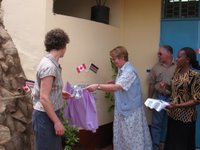Farmers Helping Farmers Officially Opens Dairy Laboratory at Wakulima Self-Help Dairy Group in Mukurwe-ini
Submitted by Teresa Mellish
February 5, 2006
 On Thursday, the Farmers Helping Farmers delegation in Kenya were delighted to officially opened the new dairy laboratory in the Wakulima Self Help Dairy Group building in Mukurwe-ini. Ken and Teresa Mellish along with Colleen Walton cut the ribbon and uncovered the plaque commemorating the opening.
On Thursday, the Farmers Helping Farmers delegation in Kenya were delighted to officially opened the new dairy laboratory in the Wakulima Self Help Dairy Group building in Mukurwe-ini. Ken and Teresa Mellish along with Colleen Walton cut the ribbon and uncovered the plaque commemorating the opening.
The dairy laboratory is being used to test milk samples to determine the reason when milk quality is not acceptable. Milk samples which are detected to be of an unacceptable quality at the milk collection points are sent to the lab for analysis. Samples are also sent when the Wakulima veterinarian wants to confirm which type of mastitis ( an inflammation of the udder) a cow has. The lab can determine which type of mastitis the cow has or if the milk has impurities in it or if it is spoiled because it has been in the sun too long.
The lab started to operate recently and it has been processing about 15 samples per day. The results of the analysis is made available to the farmer and if the cow has mastitis the Wakulima veterinarian, Dr. Ayub Kaniaru, can prescribe an antiobiotic.
Recently Farmers Helping Farmers provided each of the 5000 farmers, who ship milk to the Wakulima Dairy, with a 500 ml bottle of Mastrite, to introduce them to dipping the cows teats after milking. This combined with good sanitation and good milking practices will reduce the incidence of mastitis. AVC “vet doctor” (as he is called in Kenya) Dr. John van Leeuwen was thrilled when he was told that the incidence of mastitis has dropped substantially since each farmer has started using Mastrite.
The equipment in the laboratory was funded from a generous donation by Jack Kelly from Cornwall, PEI with matching funds from the Canadian International Development Agency.
The Farmers Helping Farmers group were very impressed with the progress being made by the Wakulima group. The lab is part of a new building recently built by the Wakulima group. In addition to the lab, the building includes offices, a board room, and a feed store.
February 5, 2006
 On Thursday, the Farmers Helping Farmers delegation in Kenya were delighted to officially opened the new dairy laboratory in the Wakulima Self Help Dairy Group building in Mukurwe-ini. Ken and Teresa Mellish along with Colleen Walton cut the ribbon and uncovered the plaque commemorating the opening.
On Thursday, the Farmers Helping Farmers delegation in Kenya were delighted to officially opened the new dairy laboratory in the Wakulima Self Help Dairy Group building in Mukurwe-ini. Ken and Teresa Mellish along with Colleen Walton cut the ribbon and uncovered the plaque commemorating the opening.The dairy laboratory is being used to test milk samples to determine the reason when milk quality is not acceptable. Milk samples which are detected to be of an unacceptable quality at the milk collection points are sent to the lab for analysis. Samples are also sent when the Wakulima veterinarian wants to confirm which type of mastitis ( an inflammation of the udder) a cow has. The lab can determine which type of mastitis the cow has or if the milk has impurities in it or if it is spoiled because it has been in the sun too long.
The lab started to operate recently and it has been processing about 15 samples per day. The results of the analysis is made available to the farmer and if the cow has mastitis the Wakulima veterinarian, Dr. Ayub Kaniaru, can prescribe an antiobiotic.
Recently Farmers Helping Farmers provided each of the 5000 farmers, who ship milk to the Wakulima Dairy, with a 500 ml bottle of Mastrite, to introduce them to dipping the cows teats after milking. This combined with good sanitation and good milking practices will reduce the incidence of mastitis. AVC “vet doctor” (as he is called in Kenya) Dr. John van Leeuwen was thrilled when he was told that the incidence of mastitis has dropped substantially since each farmer has started using Mastrite.
The equipment in the laboratory was funded from a generous donation by Jack Kelly from Cornwall, PEI with matching funds from the Canadian International Development Agency.
The Farmers Helping Farmers group were very impressed with the progress being made by the Wakulima group. The lab is part of a new building recently built by the Wakulima group. In addition to the lab, the building includes offices, a board room, and a feed store.

0 Comments:
Post a Comment
<< Home